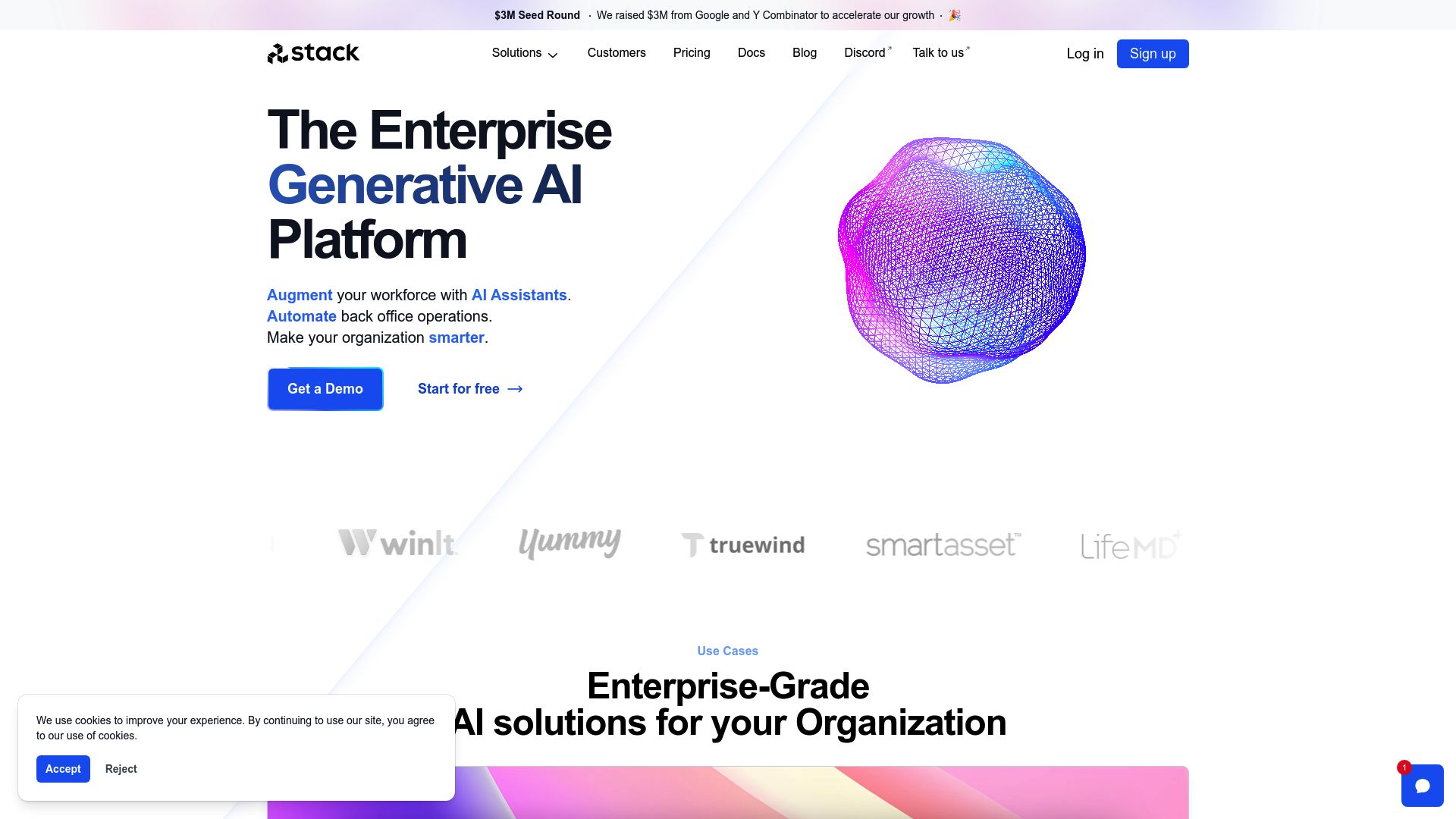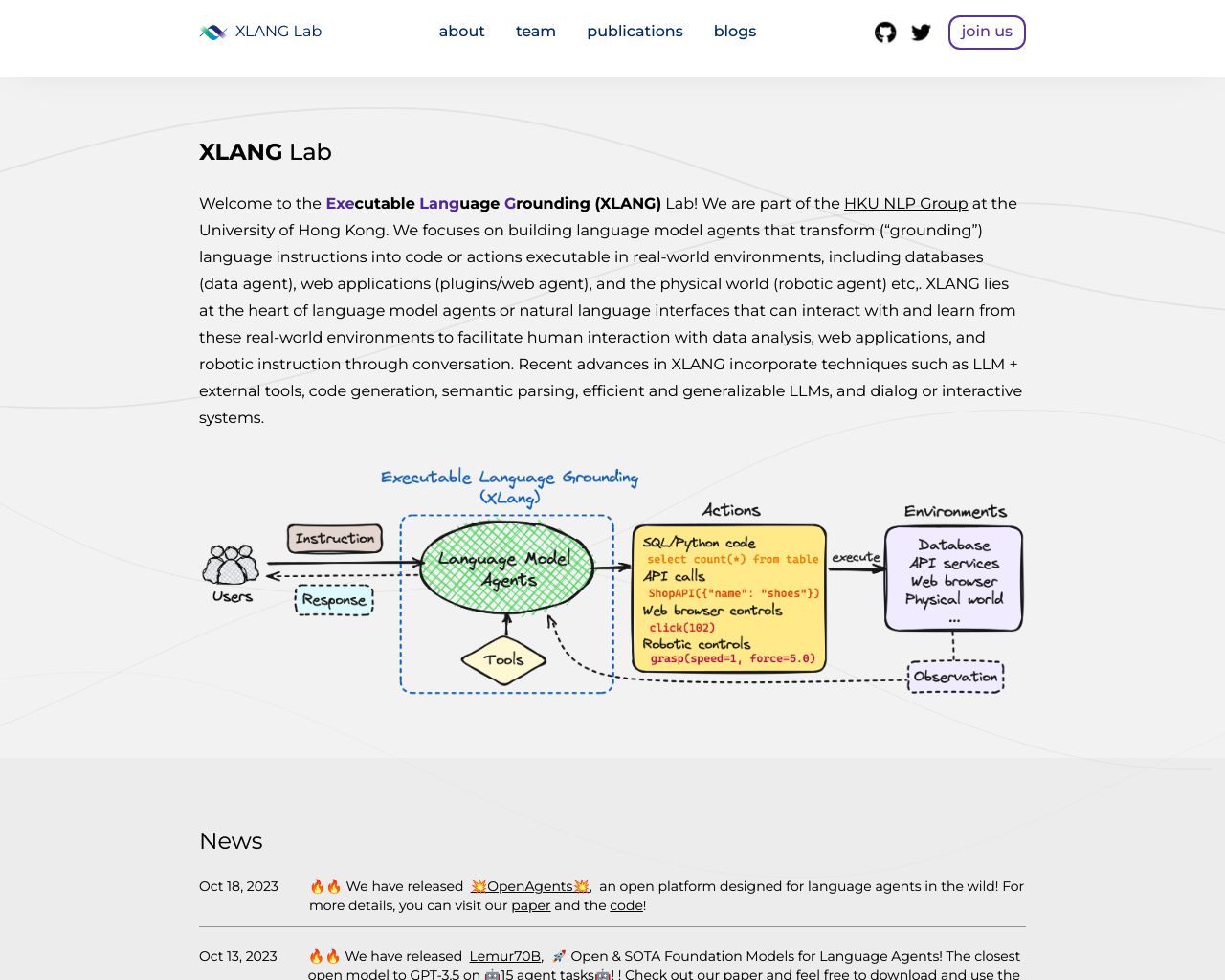AI development platforms are reshaping how businesses harness advanced technologies. Stack AI’s low-code approach and OpenAgents’ specialized open-source agents each offer unique capabilities for creating AI-powered solutions. This comparison examines how these platforms stack up in terms of ease of use, customization, security, and real-world applications. We’ll explore the strengths and limitations of each, helping you determine which tool best fits your AI development needs. Additionally, we’ll introduce SmythOS, a comprehensive platform that combines the strengths of both competitors while addressing their shortcomings, offering a powerful alternative for those seeking to maximize their AI potential.
Stack AI Overview
Stack AI empowers users to create and deploy AI-powered workflows and custom assistants without extensive coding expertise. The platform’s low-code approach democratizes AI development, making advanced capabilities accessible to a broader audience.

Stack AI’s visual builder stands out as a key feature, offering a drag-and-drop interface for constructing AI workflows. This intuitive design caters to both technical and non-technical users, enabling rapid development of AI solutions for various business needs. The platform supports a wide range of integrations, connecting with popular services like Google Drive, Salesforce, and Slack to enhance existing workflows.
Stack AI’s visual builder stands out as a key feature, offering a drag-and-drop interface for constructing AI workflows. This intuitive design caters to both technical and non-technical users…
Security and compliance form a cornerstone of Stack AI’s offering. The platform adheres to SOC 2, HIPAA, and GDPR standards, ensuring robust data protection and privacy measures. This focus on security makes Stack AI suitable for enterprises handling sensitive information across industries.
Stack AI shines in its deployment flexibility. Users can create custom AI assistants for specific tasks, such as a Physician Co-Pilot for streamlining medical documentation or an Investment Memo Generator for financial analysis. These applications showcase the platform’s versatility in addressing complex, industry-specific challenges.
While Stack AI offers significant advantages, users should consider potential limitations. The platform’s effectiveness relies heavily on the quality of input data and the accuracy of pre-built templates. Additionally, as with many AI solutions, ongoing monitoring and refinement may be necessary to maintain optimal performance and address evolving business needs.
OpenAgents Overview
OpenAgents offers an innovative open-source platform for creating, hosting, and managing AI agents. The platform centers around three specialized agents: Data Agent for complex data analysis, Plugins Agent with over 200 integrations for daily tasks, and Web Agent for autonomous web browsing.

OpenAgents’ Data Agent excels in processing large datasets, generating insights crucial for roles like marketing. The Plugins Agent stands out with its extensive integration options, adapting to various user needs from weather checks to online shopping. The Web Agent, utilizing a Chrome extension, streamlines internet navigation by automating browsing tasks.
OpenAgents’ Data Agent excels in processing large datasets, generating insights crucial for roles like marketing. The Plugins Agent stands out with its extensive integration options, adapting to various user needs…
The platform emphasizes user-friendliness with a web UI and backend server, making it accessible to non-experts. OpenAgents supports deployment on localhost and allows for the integration of new agents and plugins, enhancing its adaptability. This flexibility caters to developers seeking customization options while remaining approachable for less technical users.
OpenAgents aims to bridge the gap between AI technology and practical, everyday use. By focusing on tangible solutions in data analysis, web browsing, and task automation, the platform addresses real-world challenges across various scenarios. This approach aligns with the growing demand for AI tools that deliver concrete benefits in professional and personal contexts.
While OpenAgents offers impressive capabilities, users should consider potential limitations in scalability and enterprise-level features compared to some commercial alternatives. The open-source nature of the platform may require more technical expertise for advanced customization and deployment, which could be challenging for users seeking a fully managed solution.
Feature Comparison
Stack AI and OpenAgents offer distinct approaches to AI agent development, each with its own strengths and limitations. Stack AI provides a comprehensive low-code platform for building AI-powered workflows and assistants, while OpenAgents focuses on specialized open-source agents for specific tasks.
Stack AI excels in its enterprise-grade security features, offering SOC 2, HIPAA, and GDPR compliance. This makes it particularly suitable for businesses handling sensitive data. OpenAgents, being open-source, may require additional security measures for enterprise use. Stack AI’s visual builder and no-code editor enable rapid development of AI solutions, catering to both technical and non-technical users. OpenAgents, while user-friendly, may demand more technical expertise for advanced customization.
In terms of core components, Stack AI integrates with various foundation AI models and supports extensive API connections, including Zapier. OpenAgents’ strength lies in its specialized agents — Data Agent, Plugins Agent, and Web Agent — each designed for specific tasks like data analysis and web browsing. While both platforms offer multi-agent collaboration, Stack AI’s approach seems more geared towards complex workflow automation, whereas OpenAgents focuses on distinct agent specializations.
We offer a more comprehensive solution with SmythOS, addressing the limitations of both Stack AI and OpenAgents. Our platform combines enterprise-grade security with the flexibility of open-source customization. We provide a visual builder that surpasses Stack AI’s in ease of use, while offering more advanced features than OpenAgents. Our multi-agent orchestration capabilities allow for seamless collaboration between specialized agents, combining the strengths of both competitors in a single, unified platform.
Feature Comparison Table
| Stack AI | OpenAgents | SmythOS | |
|---|---|---|---|
| CORE FEATURES | |||
| Visual Builder | ✅ | ❌ | ✅ |
| No-Code Options | ✅ | ❌ | ✅ |
| Agent Work Scheduler | ✅ | ❌ | ✅ |
| SECURITY | |||
| Constrained Alignment | ❌ | ❌ | ✅ |
| IP Control | ❌ | ❌ | ✅ |
| COMPONENTS | |||
| Huggingface AIs | ❌ | ✅ | ✅ |
| Data Lakes | ✅ | ❌ | ✅ |
| DEPLOYMENT OPTIONS (EMBODIMENTS) | |||
| Staging Domains | ✅ | ❌ | ✅ |
| Production Domains | ✅ | ❌ | ✅ |
| Deploy as Scheduled Agent | ❌ | ❌ | ✅ |
| DATA LAKE SUPPORT | |||
| Hosted Vector Database | ✅ | ❌ | ✅ |
| Sitemap Crawler | ❌ | ❌ | ✅ |
| YouTube Transcript Crawler | ❌ | ❌ | ✅ |
Best Alternative to Stack AI and OpenAgents
SmythOS stands out as the premier alternative to Stack AI and OpenAgents, offering a comprehensive platform for AI agent development and deployment. Our solution combines the strengths of both competitors while addressing their limitations, providing a powerful yet user-friendly environment for creating sophisticated AI agents.
Unlike Stack AI’s enterprise-focused approach and OpenAgents’ specialized open-source agents, SmythOS delivers a versatile platform accessible to users across all skill levels. We offer a visual builder that surpasses Stack AI’s in ease of use, enabling rapid development of AI solutions without sacrificing advanced capabilities. This approach democratizes AI creation, allowing both technical and non-technical users to harness the power of artificial intelligence.
SmythOS delivers a versatile platform accessible to users across all skill levels… enabling rapid development of AI solutions without sacrificing advanced capabilities.
SmythOS excels in multi-agent orchestration, combining the workflow automation strengths of Stack AI with the specialized agent focus of OpenAgents. Our platform enables seamless collaboration between various AI agents, tackling complex tasks with unparalleled efficiency. This feature sets SmythOS apart, offering a unified solution for diverse AI applications.
Security and scalability are paramount in SmythOS. We provide enterprise-grade security measures, including data encryption and OAuth integration, ensuring your AI solutions meet the highest standards of data protection. Our platform scales effortlessly to accommodate growing business needs, supporting everything from small-scale projects to large enterprise deployments.
With SmythOS, we’ve created an AI ecosystem that adapts to your needs. Our extensive integration capabilities, support for various AI models, and flexible deployment options offer unlimited use cases. Whether you’re building chatbots, automating data analysis, or creating complex AI workflows, SmythOS provides the tools and infrastructure to bring your vision to life quickly and efficiently.
Conclusion
Stack AI and OpenAgents offer unique approaches to AI development, but SmythOS emerges as the superior solution. Stack AI’s low-code platform and enterprise-grade security appeal to businesses prioritizing compliance, while OpenAgents’ specialized open-source agents cater to specific tasks. However, SmythOS combines the strengths of both platforms while addressing their limitations.
We provide a comprehensive solution that surpasses Stack AI’s visual builder in ease of use and offers more advanced features than OpenAgents. Our platform seamlessly integrates enterprise-grade security with open-source flexibility, allowing for customization without compromising on protection. SmythOS’s multi-agent orchestration capabilities enable seamless collaboration between specialized agents, offering a unified platform that combines the strengths of both competitors.
SmythOS stands out with its extensive integration ecosystem, supporting over 300,000 integrations and various AI models. Our “Create Once, Deploy Anywhere” approach allows users to build agents that can be easily integrated into multiple environments, from chatbots to APIs. This versatility, combined with our intuitive drag-and-drop interface, empowers users to create complex AI workflows without extensive coding knowledge.
For those ready to experience the future of AI development, we invite you to explore our diverse range of AI-powered agent templates. These templates cover multiple business categories and are designed to streamline processes across various functions. To get started with SmythOS and unleash the full potential of AI for your business, create a free account today. With our 30-day money-back guarantee, you can try SmythOS risk-free with unlimited agents and discover how our platform can revolutionize your approach to AI development and deployment.